Feature
Marvel's Cine-CHAT-ic Universe: Iron Man (2008)
Movie Feature
Ali Gray,
Matt Looker,
Becky Suter,
Ed Williamson
22nd September 2017
Is it too late to change the name?
Please, please, please, can we find a better name for this, guys.
Matt: Yeah, it's weird watching the film again and seeing that it has the confidence of a movie launching a massive franchise, but that's totally at odds with the history of production and the fact that it was seen as a huge gamble by Marvel at the time. It struts around with all the confidence of any Marvel movie released in the last couple of years. As you say, this is surely all down to Favreau. The loose, semi-improvisational dialogue and fast-paced quipping in this film basically set a tone that Marvel have set their entire formula on. Every film feels part of the universe that this film built (excepting perhaps The Incredible Hulk).
The only difference here is that it genuinely feels fresh and off-the-cuff, and in copying this style for the rest of the MCU, it's clearer to understand the criticism that has been levelled at the later films for being too formulaic, because by comparison, they can often feel like they contain watered down cover versions of the energy and charisma that this one has.
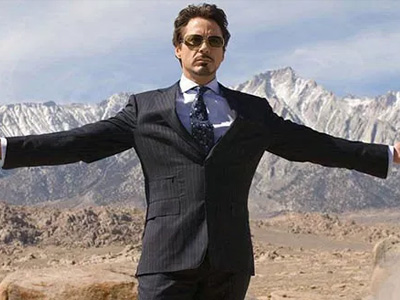
Becky: Favreau is definitely more of an actor's director, and compared to the latter Marvel movies it shows here - I remember thinking at the time that there wasn't nearly as much action as I expected. Where the later films water down the charisma they up the ante with all the smashy-crashy stuff. Everything is literally resting on Iron Man's shoulders.
I was surprised how little it had dated in terms of SFX, but what does date it now less than 10 years later is how underwritten the female characters are, pre-Black Widow. Pepper Potts is nothing more than an archetype and it's interesting to think how few movies would let that slide nowadays.
Ali: I'm actually going to disagree with Becky because I think the character of Pepper Potts is quite important to the overall story, in that she's what keeps Tony grounded and keeps him connected to his humanity. I mean, yes, she's only playing a supporting role in someone else's story, but it's called Iron Man, it's not called Pepper Potts, because that would be a silly name for a movie, even one about a character called Pepper Potts. In any case, she has the expression and the tone of a woman who has spent a lifetime dealing with her male boss's unbelievable bullshit, which is quite hard to capture.
Matt: I have to side with Ali too (sorry Becky). I think the chemistry with Gwyneth is fantastic and it presents a dynamic that is not only desperately needed in this film - an actual match for Tony Stark when literally everyone else in this film, including Happy and Rhodey, just put up with his bullshit - but is an interesting relationship already. I know it seems that she is the put-upon assistant forced to do his bidding, but that's literally her job at this stage. The fact that the film writes her as someone who knows Stark better than anyone else, is closest to him emotionally and - across all the Iron Man films - the person who makes him become a better man, is a considerable service to her character.
Okay, it's not incredibly enlightened or progressive, but at this time, I think it's to the film's credit that Potts is written the way she is, especially considering this is all based on dated source material that has always focused predominantly on male characters and never cared much for the female ones. If anything, the shocking thing here is that this film sets a strong precedent for its main female character/love interest, that is never really followed through on in any subsequent Marvel movie (aside from Peggy Carter, God rest her soul).
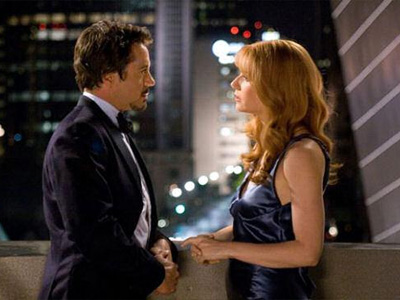
Becky: What's more interesting is how Iron Man sets up Stark as the most fragile and vulnerable member of The Avengers - after being held captive in Afghanistan and then having his mentor turn against him, it's no wonder he eventually develops PTSD.
Ali: I think Iron Man movies are at their best when Tony is most vulnerable, which is why Iron Man 3 is the best of the series and why Civil War is one of my favourites. I like Tony Stark best when he's up against it and wrestling with moral dilemmas. The whole billionaire playboy thing is good for about ten minutes of material per film, max.
Ed: The thing that really struck me about it at the time was that it felt contemporary. Superhero films had always existed in a bit of a bubble - invented villains, politicians and conflicts, etc - but this acknowledged the existence of the war in Afghanistan and made it a key part of Tony's backstory. The Raimi Spider-Man films felt like they had a new relevance post-9/11 when the American idea of heroism had been rethought, but they never mentioned it. This actually put the film in the same universe as you, and I don't think I'd ever seen that before. It felt risky, like it was going to oblige them to acknowledge other world events as they carried on with the franchise, and I liked that.
Ali: Have any of the Marvel movies ever addressed 9/11? Were any Marvel heroes even banging around in 2001? Maybe not, although Captain Marvel is set in the '90s so I'm looking forward to hearing her excuse once she shows her face again.
Ed: No, they never mention 9/11, but the whole concept of a world needing saving by heroes is informed by it, I think. And the acknowledgement that destroying whole city blocks has actual consequences beyond sweeping it all up probably wouldn't be there either. (Tony's PTSD after Avengers 1; the implied effect on nearby Hell's Kitchen in the Daredevil TV show - more crime etc because Manhattan gets rebuilt but no one's bothered about the poor neighbourhood next door).
Matt: No, no one mentions 9/11. I think the point eventually becomes that the alien invasion in Avengers becomes this universe's 9/11. It is frequently referred to across all properties (including the TV shows) as a point of reference for destruction and chaos in New York.
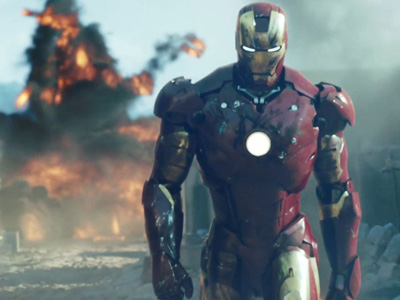
Ali: The only bits that feel completely out of place are the scenes with Leslie Bibb's Uptight Reporter Lady Who Wants It Really, although I guess you could argue this is all character-building stuff. Still feels a bit off, though. You don't get many superheroes who are out and out shaggers. Also the scenes where Iron Man flies, he does the really dainty little thing where he sticks his hands out by his side, which looks really, really bizarre.
Matt: I agree about Christine Everhart. Stark has this line, something like "I was caught doing a piece for Vanity Fair", which is supposed to be funny, but comes off as a bit cringey-braggy to me. I guess it all adds to the whole "playboy dick" thing, but I feel like he manages that in the actual interview. He doesn't need to shag her too, and then ditch her in the morning. Although it does at least lead to that great "taking out the trash" line from Pepper.
Becky: Pepper literally plays the fantasy woman though. She's feisty without being being too feisty; she calls him out on his bullshit but it's in an "Oh, but that's just Tony!" type of way, and has fallen in love with him despite him clearly being a bit of a prick. She can only do what Stark tells her to do, so the strong sense is that her only purpose in life is to help Tony be Tony and without him, there's no indication that's she's doing anything interesting or worthwhile off-screen. She doesn't mind that he sleeps around and look at the way she treats other women (and how women treat each other in this film in general). Maybe it's also Goop's portrayal, but she comes across as one-dimensional more than world-weary. Potts is just his nanny.
Ali: The sexy nanny. Sexy ginger nanny who also does your financing and looks the other way when you want to knob a journalist.
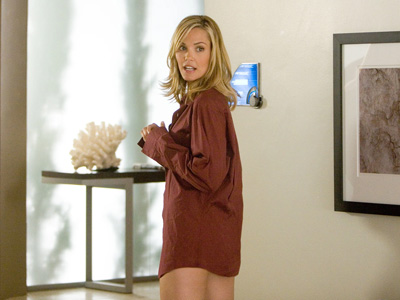
Ali: I know we always say that Marvel movies have a villain problem, but I can't help but think Jeff Bridges would have been a brilliant villain if his arc had extended over a couple of movies and not just spaffed out over one. He's so obviously the villain right from the very beginning so the twist has next to no impact. It's a shame because Bridges can do that matey-blokey thing just as well as he can do proper physical intimidation, and his look is the absolute bollocks. Not to get off base, but I am struggling to remember anything at all about Iron Man 2, so I don't think it's unfair to suggest to Marvel that they retroactively undo all of their continuity to carry out my wishes and remake Iron Man 2 with my precise specifications.
Matt: Actually, I'd go so far to say that the Stark-Stane relationship would be more interesting if they made more of him being a father surrogate as well as mentor. They make such a deal out of Tony's daddy issues in the later films that it would have worked brilliantly here as Stane taking Stark under his wing and then turning on him. I don't like the "Well, what they SHOULD have done is..." style of criticism, but given Iron Man 2 and 3, that would have felt more in keeping with Tony's key themes.
Ali: You never really get that Stane turning heel feels like a betrayal because you never really see them as friends, just occasional colleagues. There's a ludicrous magazine cover in an early montage where the headline is something like 'Tony Stark is back!' and in the background Obadiah Stane is sulking, quite literally in the shadow of his partner. The ending would have had much more emotional heft if you felt like there was any sort of friendship at stake, but instead it's just two rich men hitting each other in their robot clothes.
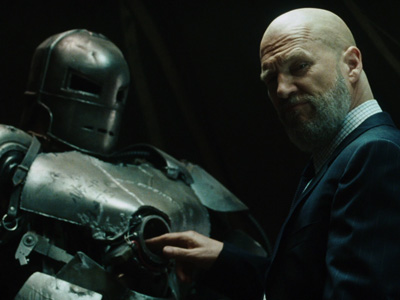
Matt: I think the key decision that Marvel made with these movies is to focus on character over superheroics. We don't really see any of the characters struggle with secret identities or double lives, which means that, in this film Downey Jr is Tony Stark is Iron Man. There are no boundaries between roles, which means that whatever happens to Iron Man, you don't question that it is actually happening to Tony Stark. When Iron Man flies the missile into space at the end of the Avengers, you don't think of him as a safely cocooned magic robot suit, you know that it is absolutely Tony Stark risking everything to pull off a terrifying feat, and that's the main reason any of these films have a sense of stakes. I'd argue that all of that stems from the final line in this movie: "I am Iron Man", which at the time was unprecedented. I remember seeing that for the first time and thinking "Oh, so they're just not going to go down the whole secret identity route? This is something I haven't seen before".
Ali: There's that brilliant scene where Stark learns how to fly in his basement for the first time, and it's just him and his adorable little DUM-E mechanical arm. The robot has the slightest semblance of personality but really it's Robert Downey Jr doing all the heavy lifting; bickering with it, yelling at it, lambasting it for spraying him with the fire extinguisher. It's such a non-scene that'd be completely glossed over in most other 'learning to be a superhero' montages, but the character overflows here. To paraphrase John Hammond in Jurassic Park, Downey really does suffer from an deplorable excess of personality.
Becky: Oh, he's got it by the bucketload. And without wanting to go too off-topic, I wonder how much of Marvel's luck has come down to great casting, Norton's Hulk aside, obvs. Another misfire like that and the franchise could have been toast.
Ali: Iron Man's casting in general is *amazing*. Downey Jr is the most obvious masterstroke, but there's not a role here I would recast given the choice. Even Terrence Howard makes a good Rhodey. Shame he was too expensive. I wonder if Terrence Howard ever sits around his crib and thinks, I must rewatch all the Marvel movies that I'm not in. I bet he hasn't even seen Iron Man 2.

Support Us
Follow Us
Recent Highlights
-
Review: Jackass Forever is a healing balm for our bee-stung ballsack world
Movie Review
-
Review: Black Widow adds shades of grey to the most interesting Avenger
Movie Review
-
Review: Fast & Furious 9 is a bloodless blockbuster Scalextric
Movie Review
-
Review: Wonder Woman 1984 is here to remind you about idiot nonsense cinema
Movie Review
-
Review: Borat Subsequent Moviefilm arrives on time, but is it too little, or too much?
Movie Review
Advertisement
And The Rest
-
Review: The Creator is high-end, low-tech sci-fi with middling ambitions
Movie Review
-
Review: The Devil All The Time explores the root of good ol' American evil
Movie Review
-
Review: I'm Thinking Of Ending Things is Kaufman at his most alienating
Movie Review
-
Review: The Babysitter: Killer Queen is a sequel that's stuck in the past
Movie Review
-
Review: The Peanut Butter Falcon is more than a silly nammm peanut butter
Movie Review
-
Face The Music: The Bill & Ted's Bogus Journey soundtrack is most outstanding
Movie Feature
-
Review: Tenet once again shows that Christopher Nolan is ahead of his time
Movie Review
-
Review: Project Power hits the right beats but offers nothing new
Movie Review
-
Marvel's Cine-CHAT-ic Universe: Captain America: Civil War (2016)
Movie Feature
-
Review: Host is a techno-horror that dials up the scares
Movie Review
